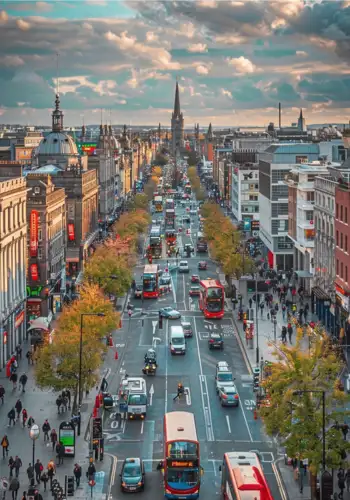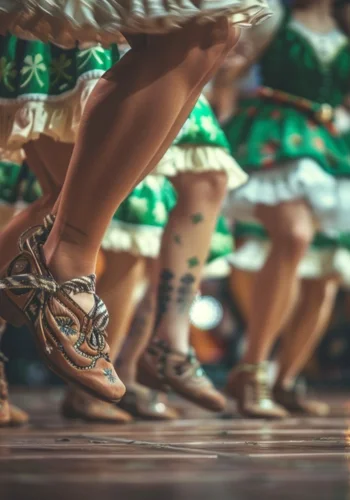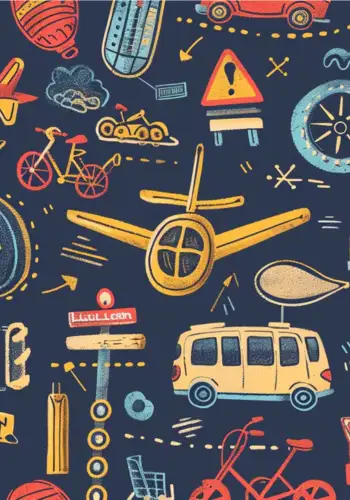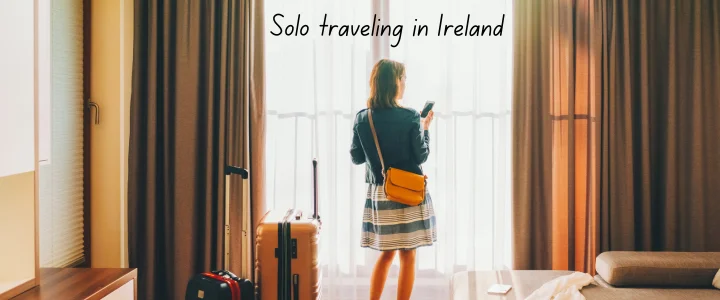Traveling To Ireland Alone:
Solo traveling in Ireland offers unique experiences that cater to all interests. History buffs can explore ancient castles and ruins, nature lovers can hike breathtaking trails, and foodies can indulge in the local cuisine and vibrant pub culture. The flexibility of solo travel allows you to craft your own itinerary, ensuring that your trip is tailored to your personal interests and pace.
Unlike the bustling streets of Berlin, the quaint charm of Belgium, or the romantic allure of Paris, Ireland provides a mix of serene landscapes and rich cultural experiences that stand out in Europe.
Ireland is a dream destination for solo travelers, offering a perfect blend of stunning landscapes, rich history, and warm, friendly locals. Whether you’re exploring the vibrant streets of Dublin, wandering through the charming Dingle Peninsula, or marveling at the rugged beauty of the Wild Atlantic Way, Ireland provides a safe and welcoming environment for those traveling alone.
Why choose Ireland for solo travel? For starters, the country is known for its safety and the famous Irish hospitality. As a solo traveler, you’ll find it easy to strike up conversations and make connections, whether you’re in a bustling city pub or a quiet countryside village. Plus, Ireland’s extensive public transportation system and well-maintained roads make getting around a breeze,
Table of Contents
| Key Takeaways | Details |
|---|---|
| Accommodation Options | Diverse options including hostels, B&Bs, hotels, unique stays like castles, and eco-friendly choices. |
| Hostels | Affordable and social; examples include Kinlay House (Galway) and Generator Hostel (Dublin). |
| Bed and Breakfasts | Cozy and personal; notable mentions are Murphy’s Farmhouse (Dingle Peninsula) and Ardawn House (Galway). |
| Hotels | Ranges from budget to luxury; examples are The Merrion (Dublin) and The River Lee (Cork). |
| Booking Tips | Research reviews, choose central locations, and check security measures. |
| Unique Stays | Stay in castles like Ashford Castle (County Mayo) and eco-friendly options like Inis Meáin Restaurant & Suites. |
| Budget-Friendly Options | Budget hotels like Jury’s Inn (Dublin) and Travelodge (Cork); camping and glamping options. |
| Public Transport | Includes Bus Éireann, Dublin Bus, and Irish Rail; reliable for city and inter-city travel. |
| Car Rentals | Offers flexibility; consider driving tips like left-side driving and narrow roads. |
| Cycling | Adventurous option with routes like Wild Atlantic Way and Great Western Greenway. |
| Domestic Flights | Quick travel between major cities; airlines include Aer Lingus and Ryanair. |
| Navigation Tips | Diverse options include hostels, B&Bs, hotels, unique stays like castles, and eco-friendly choices. |
| Best Modes of Transport | Public transport for budget travel, car rentals for flexibility, cycling for immersion, flights for time-saving. |

Planning Your Solo Trip to Ireland
When to Visit Ireland
Choosing the right time to visit Ireland can significantly enhance your solo travel experience. Ireland’s weather is notoriously unpredictable, but each season has its own charm.
- Spring (March to May): This is a wonderful time to visit as the landscape bursts into bloom. Temperatures are mild, and the tourist crowds are not yet at their peak.
- Summer (June to August): Summer offers the best weather, with long daylight hours and numerous festivals. However, it is also the busiest and most expensive time.
- Autumn (September to November): The autumn months bring cooler temperatures and beautiful fall foliage. It’s a quieter time to visit, and prices are lower.
- Winter (December to February): Winter is the off-season, with shorter days and cooler temperatures, but it’s a cozy time to experience Ireland’s indoor attractions and festive spirit.
Travel Tips: Always pack layers and waterproof gear regardless of the season, as Irish weather can change rapidly.
Travel Documents and Requirements
Before you embark on your solo adventure, ensure you have all the necessary travel documents.
- Visa and Passport Requirements: Citizens from the EU, USA, Canada, Australia, and many other countries do not need a visa for short stays. Always check the latest requirements based on your nationality.
- Health and Travel Insurance: It’s crucial to have comprehensive travel insurance that covers medical expenses, trip cancellations, and personal belongings.
- Currency and Money Matters: The currency in Ireland is the Euro (€). Northern Ireland uses the British Pound (£). It’s advisable to have some local currency on hand for smaller purchases, though credit and debit cards are widely accepted.
Booking Flights and Accommodation
Finding affordable flights and suitable accommodation is a key part of planning your trip.
- Flights: Use comparison websites like Skyscanner or Google Flights to find the best deals. Consider flying into smaller airports such as Shannon or Cork for cheaper options.
- Accommodation: Solo travelers have a variety of options, from hostels and guesthouses to hotels and Airbnb. Hostels are great for meeting other travelers, while Airbnb can offer unique, local experiences. Popular booking platforms include Booking.com, Hostelworld, and Airbnb.
Travel Tips: Book accommodations in central locations to minimize travel time and increase safety, especially if you plan to explore nightlife or early morning activities.

Packing for Your Solo Trip
Essential Items to Pack
Packing smartly is crucial for a comfortable and hassle-free trip. Here are some essentials to consider:
- Clothing: Ireland’s weather can be unpredictable, so pack layers. Include waterproof jackets, comfortable walking shoes, and versatile clothing that can be layered.
- Travel Gear: A good backpack, a reliable power bank, universal adapters, and a quality camera are must-haves.
- Health and Safety: Pack a basic first-aid kit, personal medications, and copies of important documents.
Travel Light and Smart
As a solo traveler, it’s important to pack light to make moving around easier.
- Packing Tips: Roll your clothes to save space, use packing cubes to organize, and choose multi-purpose items like a scarf that can serve as a blanket or pillow.
- Must-Have Items vs. Nice-to-Haves: Prioritize essentials and leave behind items you can easily purchase in Ireland if needed.
Packing Checklist:
- Passport and travel documents
- Travel insurance details
- Weather-appropriate clothing
- Toiletries and personal hygiene items
- Mobile phone and charger
- Travel guidebook and maps
- Emergency contact information

Getting Around Ireland
Public Transportation
Ireland boasts a reliable and extensive public transportation network, perfect for solo travelers.
- Buses and Trains: Companies like Bus Éireann and Irish Rail connect major cities and towns. For longer journeys, consider taking the train for comfort and scenic views.
- Using Public Transport: Purchase a Leap Card for convenient and discounted travel on public transport in Dublin and surrounding areas.
Travel Tips: Always check the timetable and routes in advance, especially for rural areas where services may be less frequent.
Renting a Car
Renting a car provides the freedom to explore Ireland at your own pace.
- Pros and Cons: Driving allows you to visit off-the-beaten-path locations, but remember that driving is on the left side of the road. Narrow country lanes can also be challenging.
- Car Rental Tips: Book in advance for the best rates, ensure you have a valid driver’s license, and understand the insurance options.
Safety Tips: Be cautious on rural roads, adhere to speed limits, and familiarize yourself with local driving laws.
Cycling and Walking
For a more immersive experience, consider cycling or walking.
- Best Routes for Cycling: The Wild Atlantic Way and Ring of Kerry offer stunning cycling routes. Companies like Overland Ireland provide guided cycling tours.
- Walking Tours and Trails: Explore cities on foot or tackle famous trails like the Dingle Way.
Safety Tips: Always wear a helmet when cycling, follow local traffic rules and stay on marked trails.
Safety Tips for Solo Travelers in Ireland
General Safety Tips
Traveling solo can be incredibly rewarding, but it’s important to stay safe. Ireland is generally a safe country, but like any destination, it’s wise to take precautions.
Staying Safe in Cities
- Stay in Well-Lit Areas: Stick to well-lit, populated areas, especially at night.
- Avoid Unfamiliar Neighborhoods: Research neighborhoods before visiting. Areas like Temple Bar in Dublin are safe and lively, while others might be less secure.
- Keep Valuables Secure: Use a money belt or hidden pouch to keep your valuables safe. Avoid flashing expensive items in public.
Emergency Contacts and Numbers
- Emergency Services: Dial 112 or 999 for police, fire, or medical emergencies.
- Embassy Contacts: Keep the contact details of your country’s embassy handy. In Dublin, the U.S. Embassy is located at 42 Elgin Road, Ballsbridge, Dublin 4.
Health and Medical Care
Ireland has a good healthcare system, and solo travelers can access medical services if needed.
Travel Insurance
- Get Comprehensive Insurance: Ensure your travel insurance covers health, accidents, and theft. This is crucial for any unexpected incidents.
- Keep Documents Accessible: Have a copy of your insurance policy and emergency contacts with you at all times.
Pharmacies and Medical Facilities
- Pharmacies: Known locally as chemists, pharmacies are widely available. Boots and Lloyds are common chains.
- Hospitals: Major cities have hospitals with A&E (Accident & Emergency) departments. For minor issues, visit a GP (General Practitioner).
Transportation Safety
Using public transport and other modes of travel safely is essential for solo travelers.
Public Transport Tips
- Use Official Taxis: Only use licensed taxis and rideshare services like Free Now. Confirm the driver and vehicle details before getting in.
- Bus and Train Safety: Keep an eye on your belongings and avoid isolated stops, especially at night. Irish Rail and Bus Éireann are reliable services.
Driving in Ireland
- Driving Tips: If renting a car, remember that Ireland drives on the left. Familiarize yourself with local traffic laws and road signs.
- Insurance and Documentation: Ensure your rental includes full insurance coverage and carry your driver’s license and rental agreement.
Personal Safety and Awareness
Being aware of your surroundings and trusting your instincts are key to staying safe.
Meeting People Safely
- Meet in Public Places: When meeting new people, choose public places like cafes or tourist spots. Avoid sharing too much personal information.
- Trust Your Instincts: If something feels off, remove yourself from the situation. It’s better to be cautious.
Keeping in Touch
- Stay Connected: Regularly check in with family or friends back home. Share your itinerary and updates with someone you trust.
- Local SIM Cards: Consider getting a local SIM card for your phone to ensure you have reliable access to maps, contact information, and emergency services.
Specific Tips for Women Traveling Solo
Women traveling alone should take extra precautions to ensure their safety and peace of mind.
Accommodation Safety
- Choose Reputable Places: Book accommodations with good reviews from other solo female travelers. Hostels like Kinlay House in Galway have female-only dorms.
- Check Security: Ensure your accommodation has good security measures, such as secure entry systems and staff available 24/7.
Navigating Nightlife

- Stay Sober: Keep your wits about you when enjoying the nightlife. Drink responsibly and never leave your drink unattended.
- Buddy System: If you meet other travelers, consider exploring nightlife together. There’s safety in numbers.
Dressing and Cultural Norms
- Dress Respectfully: While Ireland is generally liberal, dressing modestly in rural areas can help avoid unwanted attention.
- Cultural Sensitivity: Be aware of local customs and traditions. Respecting these can enhance your experience and interactions with locals.
Top Destinations in Ireland for Solo Travelers
Dublin: The Vibrant Capital
Dublin is a must-visit for any solo traveler exploring Ireland. The city is brimming with history, culture, and a lively social scene.
Must-See Attractions
- Trinity College and the Book of Kells: Explore Ireland’s oldest university and view the stunningly illustrated Book of Kells.
- Guinness Storehouse: Discover the history of Ireland’s most famous beer and enjoy a pint at the Gravity Bar with panoramic views of Dublin.
- Dublin Castle: Wander through the historic castle grounds and visit the Chester Beatty Library, home to a vast collection of manuscripts and artworks.
Best Neighborhoods to Stay In
- Temple Bar: Known for its vibrant nightlife, Temple Bar is perfect for those who want to experience Dublin’s social scene.
- St. Stephen’s Green: This area offers beautiful parks, shopping, and a more relaxed atmosphere.
- Smithfield: A trendy, up-and-coming neighborhood with great eateries and cultural spots.
Solo-Friendly Activities and Tours
- Walking Tours: Join a walking tour to learn about Dublin’s history and meet fellow travelers. The Free Walking Tour Dublin is highly recommended.
- Museums and Galleries: Visit the National Museum of Ireland, the National Gallery, and the Irish Museum of Modern Art.
- Pub Crawls: Experience the famous Irish pub culture by joining a pub crawl, a great way to meet people and enjoy live music.
Galway: The Cultural Heart
Galway is a lively city known for its artistic vibe and welcoming atmosphere.
Cultural Highlights and Events
- Galway Arts Festival: Held in July, this festival features performances, exhibitions, and street parades.
- Galway City Museum: Learn about the city’s rich history and maritime heritage.
- Latin Quarter: Stroll through this historic area filled with shops, pubs, and street performers.
Day Trips from Galway
- Aran Islands: Take a ferry to these rugged islands and experience traditional Irish culture and stunning landscapes.
- Connemara National Park: Explore this beautiful park with its mountains, bogs, and coastline. Ideal for hiking and photography.
- Cliffs of Moher: Just a bus ride away, these iconic cliffs offer breathtaking views of the Atlantic Ocean.
Solo Dining and Nightlife Tips
- Solo Dining: Try local delicacies at places like McDonagh’s for fish and chips or Ard Bia at Nimmos for a more upscale experience.
- Nightlife: Galway is famous for its live music. Visit pubs like Tig Coili and The Crane Bar for traditional Irish music sessions.
Cork: The Rebel City
Cork is Ireland’s second-largest city, offering a mix of history, culture, and culinary delights.
Key Attractions and Hidden Gems
- English Market: A bustling market offering a variety of fresh produce, meats, and local delicacies.
- Blarney Castle: Kiss the famous Blarney Stone and explore the beautiful gardens surrounding the castle.
- Fitzgerald Park: A serene park perfect for a leisurely stroll or picnic.
Solo-Friendly Accommodations
- Hostels: Kinlay House Cork and Sheila’s Hostel are popular choices for solo travelers.
- Boutique Hotels: Stay at The River Lee or The Montenotte Hotel for a more luxurious experience.
- Airbnb: Find unique stays in central locations for a more local experience.
Tips for Exploring Cork Alone
- Walking Tours: Discover Cork’s history and culture with a guided walking tour.
- Cafés and Pubs: Enjoy a coffee at The Bookshelf Coffee House or a pint at Sin É, known for its traditional music.
- Day Trips: Visit the picturesque town of Kinsale or take a trip to the beautiful Dingle Peninsula.
Belfast: Northern Ireland’s Gem
Belfast, the capital of Northern Ireland, offers a rich tapestry of history, culture, and natural beauty.
Historical and Cultural Attractions
- Titanic Belfast: Visit the award-winning museum dedicated to the history of the Titanic.
- Crumlin Road Gaol: Explore this historic jail with its intriguing history and guided tours.
- Botanic Gardens: A beautiful garden perfect for a relaxing stroll.
Solo Travel Safety Tips in Belfast
- Stay in Central Locations: Opt for accommodations in areas like Cathedral Quarter or Queen’s Quarter for safety and convenience.
- Use Public Transport: Belfast has a reliable bus service and the Glider rapid transit system.
- Be Mindful of Local Issues: Stay informed about local news and avoid areas with known political tensions.
Day Trips and Excursions
- Giant’s Causeway: Visit this UNESCO World Heritage site with its unique basalt columns.
- Carrick-a-Rede Rope Bridge: For the adventurous, this thrilling bridge offers stunning coastal views.
- Game of Thrones Tours: Explore filming locations from the popular TV series.

Unique Experiences for Solo Travelers in Ireland
Exploring the Wild Atlantic Way
The Wild Atlantic Way is a spectacular coastal route that stretches over 2,500 kilometers along Ireland’s west coast. It’s one of the most scenic drives in the world and perfect for solo travelers who love adventure and stunning landscapes.
Highlights of the Wild Atlantic Way
- Cliffs of Moher: These iconic cliffs offer breathtaking views of the Atlantic Ocean. Walking along the cliff edge provides a thrilling experience and a chance to take incredible photos.
- Skellig Michael: This UNESCO World Heritage site is famous for its ancient monastery and its appearance in the Star Wars films. Accessible by boat from the mainland, it offers a unique blend of history and natural beauty.
- Ring of Kerry: This looped route is famous for its picturesque landscapes, including mountains, lakes, and charming villages. It’s ideal for a leisurely drive or a guided tour.
Tips for Solo Travelers
- Plan Your Route: The Wild Atlantic Way is divided into sections, making it easier to plan your trip and decide which parts you want to explore.
- Join Guided Tours: If you’re not comfortable driving alone, consider joining a guided tour. Companies like Overland Ireland offer comprehensive tours with knowledgeable guides.
- Stay in Local B&Bs: Experience Irish hospitality by staying in bed and breakfasts along the route. You’ll get local insights and meet other travelers.
Cultural Immersion in Traditions & Culture
Ireland is rich in traditions and cultural experiences that are perfect for solo travelers looking to immerse themselves in the local way of life.
Traditional Music and Dance
- Attend a Céilí: A traditional Irish social gathering featuring folk music and dancing. It’s a great way to meet locals and experience Irish culture firsthand.
- Visit Music Pubs: Pubs like O’Donoghue’s in Dublin and The Crane Bar in Galway are famous for their live traditional music sessions. Enjoy the music and maybe even join in a sing-along.
Festivals and Events
- St. Patrick’s Festival: Celebrated across Ireland in March, this festival is a fantastic way to experience Irish culture, with parades, music, and festivities.
- Galway International Arts Festival: Held in July, this festival showcases a variety of art forms, including theater, music, and visual arts.
Engaging in Sports and Outdoor Activities
Ireland’s diverse landscapes offer numerous opportunities for outdoor activities and sports, perfect for solo travelers who enjoy staying active.
Hiking and Walking Trails
- The Dingle Way: This 179-kilometer trail around the Dingle Peninsula offers stunning coastal views, historical sites, and charming villages. It’s well-marked and suitable for solo hikers.
- The Wicklow Way: Located in the Wicklow Mountains, this trail offers varied scenery, from forests to open moorlands. It’s a great option for a multi-day hike.
Water Sports
- Surfing in Lahinch: Known for its great waves, Lahinch in County Clare is a popular spot for surfers. Local surf schools offer lessons for all levels.
- Kayaking in Killarney: Explore the lakes of Killarney National Park by kayak. It’s a peaceful way to enjoy the natural beauty of the area.
Culinary Adventures: Food and Drink
Ireland’s culinary scene is vibrant and varied, with opportunities for solo travelers to enjoy local food and drink.
Must-Try Irish Foods
- Irish Stew: A hearty dish made with lamb, potatoes, and vegetables. It’s a traditional comfort food that’s perfect after a day of exploring.
- Boxty: A type of potato pancake, often served with savory fillings. Try it at Gallagher’s Boxty House in Dublin.
- Seafood: Ireland’s coastal location means fresh seafood is abundant. Try oysters in Galway or fish and chips at the English Market in Cork.
Pub Culture
- Enjoy a Pint of Guinness: No trip to Ireland is complete without trying a pint of Guinness. Visit the Guinness Storehouse in Dublin to learn about its history and enjoy a pint with a view.
- Whiskey Tasting: Ireland is famous for its whiskey. Visit distilleries like Jameson in Dublin or Bushmills in Northern Ireland for a tasting tour.
Food Tours and Cooking Classes
- Galway Food Tours: Join a guided food tour to sample local delicacies and learn about Galway’s food scene.
- Cooking Classes: Take a cooking class to learn how to make traditional Irish dishes. Ballymaloe Cookery School in County Cork is a renowned option.

Transportation in Ireland for Solo Travelers
Public Transport
Ireland has a reliable public transport system, making it easy for solo travelers to get around without a car.
Buses
Buses are a common and convenient way to travel between cities and within towns.
- Bus Éireann: This national bus service connects major cities and towns across Ireland. It’s an affordable and efficient way to travel. For schedules and tickets, visit the Bus Éireann website.
- Dublin Bus: The primary bus service in Dublin, offering extensive routes throughout the city. The Leap Card is a convenient payment method for frequent travelers.
Trains
Trains offer a scenic and comfortable way to travel between major cities and towns.
- Irish Rail (Iarnród Éireann): Connects major cities like Dublin, Cork, Galway, and Limerick. Trains are faster than buses for long distances and offer a comfortable travel experience. Check schedules and book tickets on the Irish Rail website.
- DART (Dublin Area Rapid Transit): Serves the Greater Dublin area, providing quick access to coastal towns and suburbs.
Car Rentals
For more flexibility and the ability to explore rural areas, renting a car can be a great option.
Driving Tips
- Left-Side Driving: Remember, Ireland drives on the left side of the road. Take some time to get used to this if you’re from a country that drives on the right.
- Narrow Roads: Many rural roads are narrow and winding. Drive cautiously, especially in unfamiliar areas.
- Tolls and Parking: Be aware of toll roads and parking regulations in cities. Have some change handy for parking meters.
Rental Companies
- Hertz, Avis, and Enterprise: These international rental companies have offices at major airports and cities. Book in advance for the best rates and availability.
- Local Rentals: Smaller, local companies can offer competitive rates and personalized service. Compare prices and read reviews before booking.
Cycling
For the adventurous solo traveler, cycling can be a rewarding way to see the countryside.
Popular Cycling Routes
- Wild Atlantic Way: This stunning coastal route offers breathtaking views and challenging terrain. It’s perfect for experienced cyclists looking for an adventure.
- Great Western Greenway: A 42 km off-road trail from Westport to Achill Island. It’s suitable for all levels and offers beautiful scenery along the way.
Bike Rentals
- BikeHire.ie: Offers bike rentals and guided tours across Ireland. They provide high-quality bikes and necessary equipment.
- DublinBikes: A city bike rental scheme with stations throughout Dublin. It’s a convenient way to explore the city on two wheels.
Domestic Flights
For long-distance travel within Ireland, domestic flights can save time.
Airlines and Routes
- Aer Lingus and Ryanair: These airlines offer domestic flights between major cities like Dublin, Cork, and Shannon. Flights are short and can be relatively inexpensive if booked in advance.
- Regional Airports: Smaller airports like Donegal and Kerry offer flights to and from Dublin, providing quick access to more remote areas.
Tips for Navigating Ireland
Maps and Navigation
- Google Maps: Essential for finding your way around cities and rural areas. Download offline maps for areas with poor signal.
- Local Maps: Tourist offices often provide free maps with useful information about attractions and routes.
Language
- English and Irish (Gaelic): English is the primary language, but you’ll see signs and hear Irish in some areas, especially in Gaeltacht regions (Irish-speaking communities).
Connectivity
- SIM Cards: Get a local SIM card from providers like Vodafone or Three for reliable data and calls.
- Wi-Fi: Available in most accommodations, cafes, and public places. Use it to stay connected and update your travel plans.
Best Modes of Transport for Solo Travelers
Convenience vs. Cost
- Public Transport: Best for budget-conscious travelers and those who prefer not to drive.
- Car Rentals: Ideal for those wanting the freedom to explore off-the-beaten-path destinations.
- Cycling: Great for active travelers looking for an immersive experience.
- Flights: Best for saving time on long-distance travel within the country.
Conclusion: Solo traveling in Ireland
Solo traveling in Ireland offers an unparalleled experience filled with rich history, stunning landscapes, and vibrant culture. Whether you’re wandering through ancient castles, hiking along the breathtaking trails of the Dingle Peninsula, or savoring local cuisine in a cozy pub, Ireland caters to every interest. With a variety of accommodation options, reliable transportation, and the freedom to create your own itinerary, Ireland is an ideal destination for solo travelers.
Unlike the bustling streets of Berlin, the quaint charm of Belgium, or the romantic allure of Paris, Ireland stands out with its unique blend of serene natural beauty and warm, welcoming people. Embrace the adventure of solo travel, explore the hidden gems of Galway and Dublin, and create memories that will last a lifetime. With careful planning and an open heart, your solo journey through Ireland will be an enriching and unforgettable experience.

